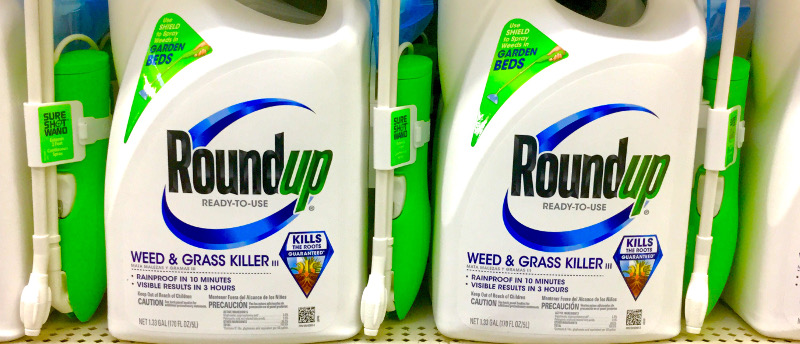Update 2 - October 23, 2018: On Monday, October 22, 2018, a San Francisco Superior Court judge denied Monsanto's request for a new trial, upholding the jury's verdict. In the ruling, the judge also reduced the total amount of the verdict award to $78.5 million.
UPDATE: Man Receives $289 Million for Roundup Lawsuit; Monsanto Faces 8,000 More Cases

Update 1 - August 28, 2018: According to the latest report from Bayer CEO Werner Baumann, Monsanto now faces more than 8,000 lawsuits over glyphosate products - more than double than previously reported.
In the first trial to test the question of whether Roundup causes cancer, a California jury has awarded $289 million in damages to Dewayne Johnson. The verdict provided for $39 million in compensatory damages and $250 million in punitive damages to punish Monsanto for its role in making a dangerous product.
The 46-year-old former school groundskeeper, who is battling terminal non-Hodgkins lymphoma, filed his Roundup lawsuit in January 2016. While two-and-a-half years seems like a long time, Johnson's case has gone faster than most product liability cases due to a California law that dying plaintiffs can expedite their legal claims.
Early Trials Set the Stage for a Bigger Battle
As the first trial of its kind, this verdict marks the beginning of what is sure to be a bigger battle over Monsanto's level of liability for cancers like Johnson's. The international agricultural company continues to insist that glyphosate, the active ingredient in herbicides like Roundup and Ranger Pro, are safe at any level. It will likely appeal the verdict in the hopes of having the verdict overturned or dramatically reduced.
Which is to say that while the verdict is undoubtedly good news to Johnson and his lawyers, there may still be a long way to go before any of the award money makes its way to the dying man. Such appeals and delays have been a matter of course with other big verdicts against large corporations in recent years. For example, the $417 million awarded to Eva Echeverria in 2017 over claims that Johnson & Johnson's talcum powder products caused her ovarian cancer was later tossed out by a California judge due to technical problems at trial and sent back for a new trial.
Whatever the final outcome may be, however, in the short term there are likely to be even more cases filed against Monsanto, given today's high jury award. There are already several thousand cases in state and federal courts across the country. At least four hundred of those lawsuits are consolidated in federal multidistrict litigation and were given a green light to move forward by the overseeing judge just last month. According to Monsanto's own latest annual report, the company was fighting more than 3,100 glyphosate lawsuits as of the end of 2017, and hundreds more have been filed since.
The Problems with Roundup and Glyphosate
The jury's verdict rested on the question of whether or not Roundup likely contributed to Johnson's non-Hodgkin's lymphoma. Monsanto maintained that glyphosate itself is safe, even in large quantities. The plaintiff's lawyers, however, argued that the mix of chemicals found in Roundup - which includes the surfactant ethoxylated tallow amine, among other things - could have made the glyphosate more dangerous.
Monsanto attempted to defend itself by relying on broad-based studies that have shown glyphosate exposure to have little or no effect on users. In response, plaintiff's lawyers pointed to the classification of glyphosate as a "possible human carcinogen" by the International Agency for Research on Cancer. California State tried to require a Proposition 65 warning label on Roundup and other glyphosate-containing products, based on the IARC's classification, but a federal judge ruled in July that such a label was outside the scope of the labeling law.
In any event, there is no scientific consensus yet on the effects of glyphosate itself, and there has been almost no research done on the combination of glyphosate with surfactants. Just last month, a review of glyphosate and cancer risks in the Journal of Carcinogenesis calling for more toxicological study of the pesticide in combination with other chemicals, to ensure that studies looking only at glyphosate did not miss any possible side effects. Such studies are definitely necessary, considering a study published by Irish researchers last week showed that workers who use glyphosate regularly have higher concentrations of the chemical than shown in some environmental studies.
Does Roundup Really Cause Cancer? Roundup & CancerHow Will Bayer Respond to the Verdict?
The other wrinkle in the story is the ongoing acquisition of Monsanto by Bayer, the German pharmaceutical and agricultural conglomerate.
While Monsanto continues to sell Roundup and other weed-killer products containing glyphosate, Bayer recently announced the discontinuation of its Essure birth control devices days ahead of the release of a Netflix documentary highlighting the contraceptive's severe side effects. While Bayer did not state that the high cost of Essure lawsuits played a part in the decision to stop marketing of the product in the U.S., it seems unlikely that the company did not factor in the ongoing litigation risks.
The question remains, however, whether Bayer will be open to a Roundup settlement, or possibly removing the product from market altogether. For now, the company continues to fight existing lawsuits, but management and investors may not be so keen on battling Bayer's growing list of high-profile lawsuits that could take time, attention, and money away from the integrated company. If the $289 million verdict stands up under appeal, and if other high-value verdicts follow suit, the company may be more open to settling than it was in the past.
